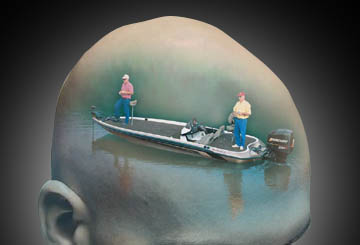Pro pointers No. 5: What’s your job?

In some ways listening to anglers discuss performance-psychology concepts reminds me of that old saying about the weather: “Everybody talks about it, but nobody does anything about it.”
Sure, most competitive anglers believe in the importance of confidence and focus, and they know the risks associated with poorly managing the pressure of tournaments. They might even think that mental rehearsal, sound organizational skills and visualization techniques are helpful to some athletes.
Still, it’s not easy to translate performance-psychology concepts into specific action plans. Here, however, is a unique, down-to-earth perspective you might find interesting.
Dr. Kirsten Peterson is a performance psychologist who works with U.S. Olympic athletes. At a recent sports-psychology conference, Dr. Peterson presented a technique she uses called “What’s Your Job?”
From a performance standpoint, your “job” becomes performing competition behaviors that are associated with success. To start with, this requires anglers to confront the Myth of Control common in all athletic endeavors. The Myth of Control leads athletes to incorrectly believe they are in charge of, or have control over, final outcomes.
Illustrations of the Myth of Control abound in post-competition interviews where both winners and losers talk about intangibles like motivation, effort and desire to explain why they won or lost. Winners say things like, “We knew what we had to do,” or “We had the focus-desire-drive to win.” Those on the losing side make comments such as, “We just didn’t bring our A game today.”
In both instances competitors talk as if they had control over the final score, though this is clearly not the case. If you actually had control over winning or losing, why wouldn’t you win all the time?
From a competitive angler’s standpoint, then, your primary focus should not be on winning the next tournament, principally because you do not have control over winning this, or any, event. Think about it this way: Does it really do any good to stand in your boat on tournament day and tell yourself, “I really want to win today!”?
Of course not! Every other competitor in the tournament field is probably thinking the same thing. You can have winning the tournament as a goal, but what you need to focus on are specific behaviors that actually make a difference in how many fish you catch. (Keep in mind also that years of psychological research show both laboratory animals as well as people can and do make themselves physically sick trying to control uncontrollable events!)
Once athletes give up the Myth of Control, they become free to focus on specific behaviors that increase the probability they will perform at their best. This is where the technique “What’s Your Job?” becomes useful.
Your job, as Dr. Peterson describes it, should be two or three competition behaviors (something you DO!) which are 1) associated with success, and 2) behaviors you have fully mastered.
One competitor I know used this technique successfully in a recent tournament. He described it this way: “In this event, I was on unfamiliar water. I decided my first job was to remain as open-minded as possible and stay in search mode until I made contact with fish. In the past, I have tried too many times to decide in advance where the fish should be in a given body of water, and I’ve wasted too much time on a few spots instead of putting most of my effort into searching for fish.
“My second job, once I found fish,” he continued, “was to rotate through a series of baits, both to give the fish different looks and to see if there was a specific lure or color the fish preferred.
“And because I’m a pretty impatient guy, always in a hurry, I decided my third job was to take my time with the bites I did get. As it turned out, I managed to only get six bites the first day. But I got them on four different lures in three different colors, and I landed all six fish!”
His story went on to describe the remainder of the tourney: “The second tournament day was much worse. Weather conditions had deteriorated, and the bite was clearly off. However, I can’t tell you how helpful it was to remind myself that ‘my job’ was to keep fishing in search mode. At the end of the day, I had nearly every stick in my rod locker strewn across the deck of my boat. But I hung in there and managed to land three of four bites. Had I been able to remain patient with all my bites, as in ‘take care of job No. 3,’ I would’ve won.
“However, it was very clear to me that defining my job as specific behaviors allowed me to stay focused rather than become distracted by the bad weather and the uncooperative fish.”
So, try putting your competitive efforts in this context. Ask yourself, “What’s My Job?” and answer it with specific behaviors you are already good at. And let me know if this technique makes a difference in your next tournament.

————————————————–
Jay T. McNamara, Ph.D., L.P., also known as Dr. Fish, recently finished his book “The Psychology of Exceptional Fishing.” You can order it by contacting Jay via e-mail at this address: [email protected].
————————————————–
Jay T. McNamara, Ph.D., L.P., is a psychologist, who is also an avid bass and walleye angler. With more than 26 years of professional experience complemented by participation in competitive fishing at local and national levels, he is uniquely qualified to illustrate how performance psychology principles apply to tournament fishing.